March 2004 Onno Purbo Workshop
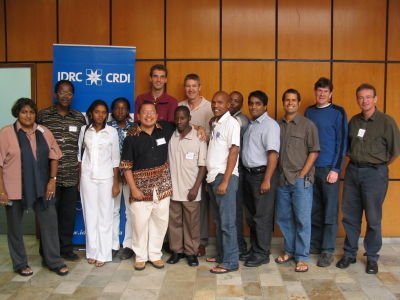
Community Networks - Creating a Wave for Social Change
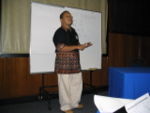
How can communities access technology in a simple to use manner in order to create their own Internet networks?
A possible solution to this challenge was presented by Onno Purbo at a workshop held at the CSIR on 3 – 5 March 2004. As an important milestone in an IDRC funded regional project, partners from Angola, Mozambique, South Africa and guests from Malawai and Kenya were invited to this “hands on “ workshop.
“It was a unique opportunity for techies to get together and share learning and new ways of doing things” said one of the participants. “Onno has inspired us and demystified the techno-hype that many people are confronted with” said another. “Expansion to other countries will be most welcome” was the view from Kenya..
The three day workshop covered wireless technologies (WiFi) , Voice Over Internet Protocol (VOIP) and Open Source Software. The content of Onno’s presentation can be found in a wide range of publications that he has made available for free see http://www.sandbox.bellanet.org/~onno.
The three day workshop covered a wide range of practical examples from establishing the basics of community based wireless infrastructure over Windows and Linux, design of a WLAN-based Metropolitan Area Network, wireless and Ethernet Internet telephony to installing and configuring a Linux machine.
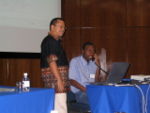
One of the questions posed to Onno was how to start a community network such as he has done in Indonesia. His response was “create a buffer, such as education and start from the outside and work in”. This is why it is important to have as many country partners on board as possible so that a wave can be created that overcomes obstacles and influences regulatory policy. In creating a buffer we are focusing on health and education applications in SA.
As part of the communication strategy each country partner involved in the project was assigned the task of sharing their experiences at the workshop on their local community radio.
Since the start of the workshop other countries have made contact expressing their desire to be part of the project. Our vision is to create a regional network of researchers and activists bringing the benefits of the Information Society to remote rural locations.
Although a modest start, this project seeks to create a wave of WiFi enthusiasts in the region who will share their knowledge and expand their community networks using innovative technologies. The research will provide important inputs into the debate at the World Summit to be held in Tunisia 2005.
Lessons Learnt
The feedback from the participants as obtained from the questionnaires was positive. Onno’s teaching style was well received and the participants enjoyed the interaction. Some indicated they did not need the Open Source introduction but others did. Perhaps some streaming of participants would be necessary in future. Most had access to laptops to participate in the VOIP demo but some “kit” to play with would have added value. The size of the group was manageable and the venue was good. More social time to network would have been ideal.
Participant Quotes
- VOIP implementation was extremely popular
- 3 days too intensive
- government departments should have been invited
- great “hands-on” learning experience
- workshop was interactive and interesting
- we want to learn from other countries, more examples and case studies
- not enough time to network or learn from other participants projects
- the proof that Onno’s approach works motivates me adopting this approach
- increase time for training
- more “advanced” participants took the lead - already familiar with Linux
- Onno excellent choice
- Content on CD very useful
- Want to implement the stuff (wireless) as part of the workshop
- Price lists and supplier details needed
News Article: First steps towards first mile, first inch technologies
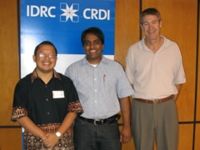
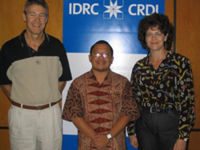
'We have to ensure that as many of our people as possible master modern technologies and integrate them in their social activities including education, delivery of services and economic activity'. These were the words of President Thabo Mbeki at the launch of the National R&D Strategy in January 2002.
In line with this, the CSIR's drive to boost R&D in the region includes forming partnerships with international organisations such as the International Development and Research Centre (IDRC). Founded in Canada in 1970, the IDRC is a public corporation that aids developing countries to use science and technology in innovative ways that will enhance the quality of life for people. The work of Dr Onno Purbo from Indonesia in opening up telecommunications to all citizens falls directly in line with the IDRC's mission of empowerment through knowledge.
Early in March, staff members from the CSIR's IST Programme were wowed by a workshop held by Purbo, a research fellow of the IDRC, as he demonstrated his revolutionary ways to obtaining low-cost Internet access. The workshop, 'First Mile, First Inch Technologies' was held at the CSIR International Convention Centre.
The meeting took a closer look at how first mile and first inch technologies could be used to free up telecommunications. First mile technology comprises connectivity technologies such as WiFi, wired Ethernet, powerline technologies, Bluetooth, narrowband HF/VHF/UHF and mesh networks, employing any of these technologies. First inch focuses on access devices such as traditional PCs, PCs running open source software, recycled PCs, thin clients and handheld PDAs, and the applications running on these devices.
'Purbo is unique in that he is part of a social movement - he volunteers his time in the community to train young people how to use their knowledge to their maximum capacity,' says Heloise Emdon of the IDRC. Emdon says the workshop was a good opportunity to set the scene for the imminent agreement to be signed with the CSIR and the IDRC's Acacia Initiative. This initiative, which began in 1996, empowers developing countries in Africa to harness ICTs to improve their socio-economic conditions.
'The ultimate goal is to establish a network of ICT social practitioners,' Emdon says. This two-year project will include a sizeable grant from the IDRC for research.'Even in terms of the IDRC, this is a big project,' she adds.
The workshop hosted project partners from Mozambique, Angola and South Africa. Participants from Kenya and Malawi showed their enthusiasm at joining this initiative.
Emdon stresses the importance, at this stage, of the commitment and the sharing of knowledge by the project partners. She feels that Purbo demonstrates this by his openness to people. Almost all his writings (he has authored 40 books) are available from his website free of charge.
'The trick is to give away your knowledge,' Purbo adds, explaining that in this way others can take the ideas further and build upon establishing a knowledge-based society. Purbo's work to set up free networks and giving all people access to communications technologies is only a means to a greater end. His main aim is for people to be self sufficient by using their own knowledge. 'ICTs are just the tools that will help us to do this,' he says. Purbo says he was very surprised at the high level of expertise of the delegates who attended the workshop. The CSIR's Chris Morris adds that the challenge is now to jumpstart the project and apply what was learnt at the workshop to each country project.
The IDRC has great aspirations for the First Mile, First Inch Technologies Project. 'We want to take this to the WSIS in Tunisia in 2005 to highlight the research done during the project,' Emdon adds.